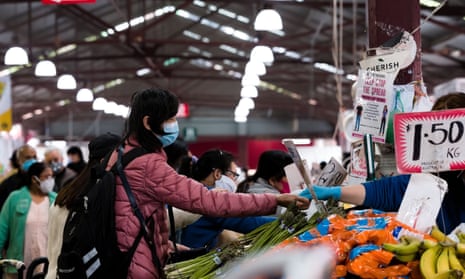Lockdowns may aid economic recovery by helping to reduce coronavirus infections, leading to a short and sharp downturn, but they disproportionately harm women and young people, according to the International Monetary Fund.
In its world economic outlook, released on Tuesday evening, the IMF called for policies targeted at women and young people to prevent “widening inequality” as a result of the Covid-19 recession.
The intervention follows widespread criticism of the Morrison government’s budget for leaving women behind, with few gender-specific measures in its package of business tax concessions and hiring credits targeted at workers aged under 35.
The IMF update projected a “less severe though still deep recession” in 2020 due to quicker emergence from lockdowns in May and June, with global growth down 4.4%, and a strong bounce back in 2021, with global growth up by 5.2%.
In Australia, the IMF report provides some support for the budget’s very optimistic assessment that growth will rebound by 4.25% in 2021 after falling 3.7% in 2020.
The IMF projected in 2021 Australia’s economy will grow by 3%, without taking account of the $98bn of new spending and foregone revenue in the budget, and unemployment will reach 7.7%.
Using a second, more responsive, method for calculating growth, the IMF forecast a 5.6% contraction in Australia’s economy comparing the fourth quarters of 2020 and 2019, and 5.2% growth comparing the fourth quarters of 2021 and 2020.
Treasurer Josh Frydenberg said the IMF had upgraded the outlook for Australia to a fall of 4.2% in 2020 despite “renewed upticks in the virus”.
“Australia’s economy remains remarkably resilient, outperforming all major advanced economies in the face of this once-in-a-century pandemic and Victoria’s second wave of infections,” he said.
Federal Labor’s shadow treasurer, Jim Chalmers, focused on the fact the IMF’s growth estimate for Australia in 2021 had been reduced by 1% to argue Australia’s “recovery is expected to be well below comparable advanced economies”.
The IMF compared countries’ Covid-19 responses to determine whether lockdowns helped mitigate or worsen the economic downturn.
It found that “adoption of lockdowns was an important factor in the recession” but voluntary social distancing “played a near comparable role”.
“Therefore, although easing lockdowns can lead to a partial recovery, economic activity is likely to remain subdued until health risks abate,” it said.
Despite deepening the downturn in the short term, “the effectiveness of lockdowns in reducing infections suggests [they] may pave the way to a faster economic recovery if they succeed in containing the epidemic and thus limit the extent of voluntary social distancing”.
Using anonymised mobile phone data, the IMF found lockdowns tend to have a larger effect on women’s mobility than on men’s, and on younger people than on older workers. Women tended to suffer from job losses in contact-intensive sectors such as retail, tourism and hospitality, and were left to do more caring for children when schools closed.
The IMF called for “targeted policy intervention … to protect the employment prospects of women and younger cohorts and prevent a widening of income inequality” such as higher unemployment benefits for vulnerable categories and paid leave for parents.
Small and medium enterprises will also be hardest hit, with up to 13% now in distress in a sample of countries including Australia, a number almost doubled by Covid-19.
The IMF warned that economies will experience “scarring from the depth of the recession and the need for structural change”, with a need to reallocate workers from “sectors likely to shrink on a long-term basis (travel) to growing sectors (e-commerce)”. It recommended supports for workers including income transfers, retraining and reskilling.
The IMF praised “sizeable, swift, and unprecedented fiscal, monetary and regulatory responses” to Covid-19. But it warned some governments “may need to consider raising progressive taxes on more affluent individuals and those relatively less affected by the crisis” and close corporate tax loopholes.
On Sunday, the treasurer, Josh Frydenberg, said the government had brought forward middle-income tax cuts because they offered the best “bang for buck”, while the remaining $130bn of middle- and high-income tax cuts will wait until 2024-25.
Labor has seized on the remarks, with Anthony Albanese signalling on Monday evening if elected he would aim to claw back some of the $130bn in the third and final stage of income tax cuts, $80bn of which goes to the highest-income earners.
Chalmers noted the IMF found that “premature scaling back” of lifelines including wage subsidies “risks pushing the economy back into recession”. Labor believes the government was wrong to cut jobkeeper wage subsidies and the jobseeker coronavirus supplement.
In his budget reply speech, Albanese unveiled a $6bn increase to childcare subsidies, arguing the measure will boost women’s participation in the workforce and overall productivity.
On Tuesday, Albanese said women were “left behind” and an “afterthought” in the Coalition’s budget.
“Our childcare initiative, removing the disincentive that’s there to work now, will make an enormous difference to working families,” he told reporters in Wollongong.
In addition to the budget’s $240m for women’s participation in the workforce, the government has argued women will benefit from general measures including income tax cuts, $4bn of youth wage subsidies and more than $30bn of business tax concessions.
